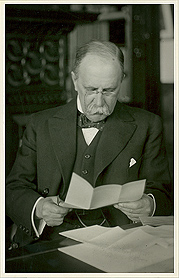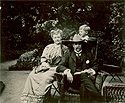
OXFORD PERIOD, 1905-1919
William Osler was offered the position of Regius Professor of Medicine at Oxford University in 1904. The university's reasons for choosing him were based on his reputation as both a scientist and a physician; Osler's acceptance was due in part to his age - at 55 years old, he did not want to continue the hectic pace of teaching, research, writing, public speaking and consulting that characterized his years at the Johns Hopkins Hospital. By contrast, Osler had few duties as Regius Professor - he oversaw the preliminary studies of medical students, examined them after they had done all their practical work in London, and bestowed their degrees. He instituted a few reforms at Oxford while he was there, strengthening the sciences and research at the university, and abolishing compulsory Greek. By virtue of his position Osler was also Master of an almshouse in nearby Ewelme, a duty in which he took an active interest.
The Oslers rented a home for their first two years in Oxford and then, in 1907, moved into the house at 13 Norham Gardens, Oxford, which became legendary among friends, family and admirers as "the Open Arms" due to the Oslers' love of entertaining. They were constantly hosting out-of-town guests and holding dinners, teas and parties for Oxford students and staff.
Osler became Sir William Osler in 1911, when he was made a baronet at the coronation of King George V.
The coming of World War One in 1914 was blight on the Oslers' Oxford years. The war made difficult the type of universalism that Osler had always felt should characterize the study and practice of medicine. During the conflict, Osler served as physician-in-chief at two Canadian war hospitals and acted as consultant to many more, both American and British. Throughout the conflict he emphasized the importance of vaccination of the troops, especially for typhoid. The Oslers also provided shelter and support for Belgian refugees.
Tragedy struck when Revere Osler, William Osler's son, who was serving in the Royal Field Artillery, was wounded in a German attack near Ypres, Belgium, in 1917. He died of his wounds soon afterwards. His parents were shattered, but continued their war work nevertheless.
William Osler died in December of 1919 of a bronchial infection. Though an autopsy was performed after his death, the exact nature of the disease is not known. His funeral was held in Oxford at Christ Church Cathedral, which overflowed with mourners.

















